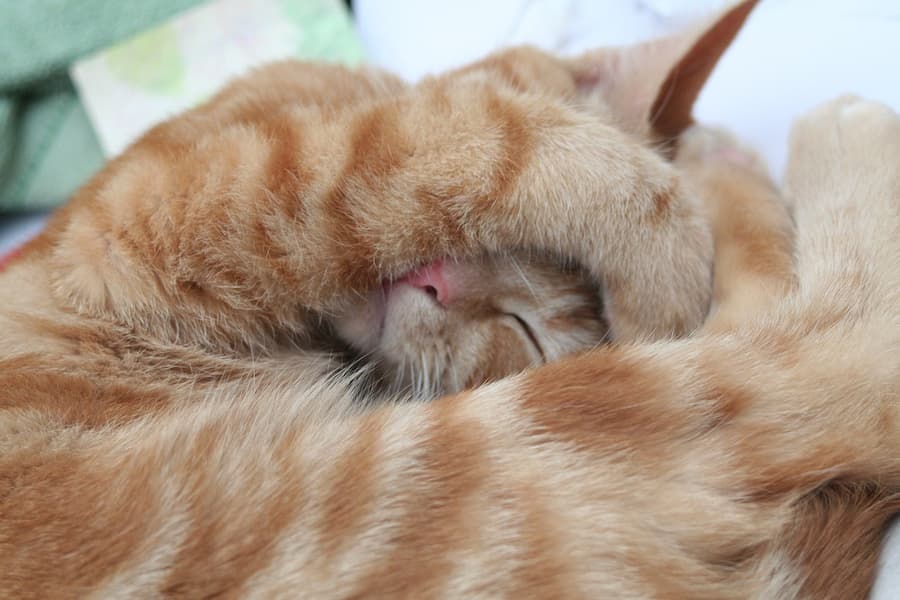Why Does My Cat Meow When They Wake up?
If you’ve seen your cat waking up their sleep meowing then it’s highly likely that they’re waking up during a dream and meowing in surprise to finding themself in a different place and a different situation from their dream.
Do Cats Dream When They Sleep?
The average cat spends around 16 hours sleeping every day. It’s also believed that cats experience dreams. While it’s impossible for scientists to confirm this, there’s plenty of evidence to suggest that cats dream while they dose.
What Do Cats Dream About?
It’s commonly believed that cat dreams involve re-living the events of the recent past.
If you notice your cat purring or moving in their sleep, they could be re-enacting memories from their day. For example, if your cat looks peaceful while their back is arched, they could be dreaming of being petted. Waving paws and chirping could suggest that they’re dreaming of an earlier hunt or play session.
Older cats normally fall into a deep sleep easier, and more often, compared to younger cats. This means that older cats are believed to dream less frequently. This can make sense as senior cats are more sedentary and will have fewer new adventures to recall.
Do Cats Have Night Terrors?
Cats spend so much time napping that it’s normal to assume that they always sleep peacefully. This makes it strange to watch a cat get unsettled by a dream. A sleeping cat may cry or howl while they’re still sleeping, or they wake up suddenly howling.
Cats do dream, as they enter REM sleep while dozing. This means that it’s almost certain that cats will have the odd night terror. It’s believed that cats dreams are a recreation. Of the events of a day. If whether the cat had a frightening experience during the day, they may be re-lived after dark.
While it can be unsettling to think that your cat could be experiencing a nightmare, you should never wake them up. Sleep, regardless of dreams, is crucial for cats. If a dream is spooking a cat, you may end up getting clawed or bitten. The best thing to do is to let them come around naturally, offering reassurance when they wake.
Dealing With Night Terrors In Cats
Watching a cat have a nightmare isn’t a pleasant experience. As a cat owner, you dedicate yourself to making sure that your cat is as comfortable as possible. However, there’s nothing you can help a sleeping cat.
It’s critical to not wake your cat up, regardless of how distressed they appear to be. The reason is that a cat will already be disoriented from their dream. Waking them up from a nightmare could make it difficult for a cat to struggle to differentiate between the dream and reality for a few moments.
If you think your cat is having a nightmare, watch your cat ensure that they don’t hurt themselves while dreaming. A cat can jerk and twitch while having a nightmare, meaning they could fall off a sofa or wherever they’re perched on. Stay close enough to tend to your cat, but make sure to be far enough away to be safe.
When you’re at an appropriate distance, you can start to tend to your cat’s needs. You can make sure that your cat is as comfortable as possible after having a nightmare.
Reassurance
Although a cat that’s in REM sleep will obviously be asleep, the cat won’t quite be dead to the world. This means that there are some measures of comfort to help your cat as they doze.
By saying your cat’s name in a soft, gentle voice, along with interspersing this with some soothing commands and assurances, like, “it’s OK.” This can seep through to your sleeping cat to some extent. By adding the familiarity of your voice, along with the association with the safety you provide—will reassure the cat.
You can also appeal to your sleeping cat’s sense of smell, too. You can do this by laying a familiar-scented item close to your cat’s nose. Add a favored blanket or cushion should be good. Again, this can register with a cat. These comforting sensations can help the brain recall something more pleasant.
This can be done until your cat wakes up. When your cat wakes up, rather than getting straight in the cat’s face straight away, take a step back, call your cat’s name, and let them approach you. At this point, you can help your cat recover from their subconscious ordeal.
Recovery
When your cat awakes, you can help them return to their old self. Rather than scooping your cat up, let your cat call the shots. It can take a cat a while to come around from a frightening dream.
If your cat wants attention straight away, reassure your cat that they’re safe and loved. You may also want to offer a treat or some playtime at this stage. It’s best for your cat to make new, positive memories as quickly as possible.
Make sure your cat is nice and warm, too. A sleeping cat experiences a drop in body temperature. A frightening dream can place a cat into low-level shock. Both of these combined can leave your cat’s temperature dangerously low. Consider offering them a blanket or a hot water bottle.
Finally, if your cat wants to go straight back to sleep, then allow them, as the cat has clearly been comforted appropriately. You should never prevent your cat from sleeping, as sleep deprivation will cause further anxiety, which can, in turn, lead to more night terrors.
Can You Prevent A Cat From Getting Night Terrors?
A cat’s brain will respond to facts and events, not imagined possibilities. In addition, cats do not watch horror films or read scary stories, so they shouldn’t be exposed to or remember frightening images.
This means, in theory, it should be easier to prevent a cat from having night terrors. Just provide them with the most idyllic life imaginable. Remember that if your cat never has a bad experience, it can never dream about it.
Unfortunately, this isn’t always the case. Just as with human dreams, cat dreams can contain random images. During REM sleep, a cat’s brain can uncover previous memories, stored because they were considered critical.
Consider any common fears and stressors that may affect domesticated cats. If you prevent your cat from experiencing these, it’s less likely to suffer from night terrors.
Abandonment
While cats won’t imagine a fictional abandonment scenario, they could recall a time that they were left alone. A cat that doesn’t have a strong bond may find your working hours away from the home frightening.
The easiest way to keep your cat calm is by establishing a good daily routine. A cat that knows what to expect every day, they’ll know that you will return every day.
If you frequently feed and play with your cat when they wake up, they’ll come to expect it. The same routine can be set at night when you come home. By timing this appropriately, your cat’s last memories of the day should be positive. In turn, this will result in pleasant dreams.
Physical Pain
Cats have excellent poker faces; rarely will they show signs of pain. An older cat, in particular, may be masking physical discomfort or illness.
While a cat can hide this during their waking hours, night terrors can tell a different story. A cat could have a dream about the pain and react accordingly.
Although, it’s also possible for a cat to re-live a single, painful experience from the past. Somebody could have stepped on the cat’s tail, or the cat could have experienced an impact injury. These bad dreams will normally be short and easily resolved, though.
If your cat is having constant nightmares, it’s best to be safe and take your cat for a check-up. Although, you should be doing this every year anyway, ideally twice a year for an older cat.
Conflict And Bullying
If your household has more than one cat, ensure that the dreaming cat isn’t being bullied. Cats that live together can often end up deferring to a single, dominant cat. This cat could end up making life miserable for the other cats.
The same will also apply to other pets in the house. For example, if you have a dog, ensure that they’re not chasing your cat. Although the dog could just be playing, the cat doesn’t know this.
If your cat often wanders outdoors, they could be coming into conflict with a neighborhood pet or wildlife. Try keeping your cat indoors for a few days, if you can. If the night terrors stop, then you’ll know the reason.
Frightening Experiences
As stress and anxiety are often linked to night terrors in humans, it’s the same for cats as well. An anxious cat can re-live previous, otherwise forgotten, experiences while sleeping. Many experiences can frighten a cat, provoking stress, including:
- Loud or unexpected noises
- Scolding for unwanted behaviors
- Getting stuck in a tree
- Being left alone for a prolonged period
- Not being fed at an expected time
- Unsanitary living conditions
Boredom
You should ensure that your cat avoids exposure to these things as much as possible. Some will be easier to circumvent than others. What is most important is that your cat doesn’t suffer any prolonged exposure.
The more stressors a cat experiences in their everyday life, the more skittish they can become. This can, in turn, lead to more nightmares. These will take a significant toll on a cat’s overall quality of life.








